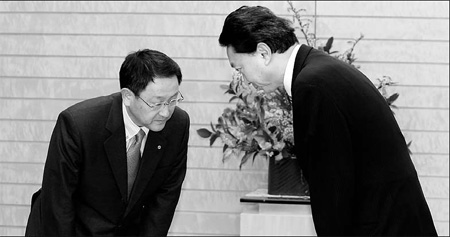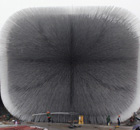Foreign and Military Affairs
Japan's China policies to stay: Experts
By Li Xiaokun (China Daily)
Updated: 2010-03-09 08:07
 |
Large Medium Small |
|
 Japanese Prime Minister Yukio Hatoyama (right) meets Toyota Motor Corp. President Akio Toyoda at Hatoyama's official residence in Tokyo on Monday. [Shizuo Kambayash / Reuters] |
Beijing: Despite plunging public support, Japan's ruling cabinet is unlikely to reshape its China policies drastically, although a few minor tweaks may be expected in the coming months, experts told China Daily on Monday.
The Democratic Party of Japan (DPJ)-led cabinet has seen its approval ratings dip to the sharpest since it came to power six months ago as funding scandals and doubts over the effectiveness of Prime Minister Yukio Hatoyama's leadership have eroded public support.
In a separate poll conducted by the Yomiuri Shimbun newspaper from Mar 5 to Mar 7, the approval ratings for Hatoyama's government fell 3 percentage points from a month earlier to 41 percent, the national newspaper reported on Monday.
Aside from the party's poor handling of political funds scandals involving its lawmakers, Hatoyama is also in a bind over a row with Washington over the relocation of the US Marines' Futenma airbase on the southern island of Okinawa. He has promised to resolve the feud by May and hinted he might resign if he cannot.
The novice Democratic Party, which last year beat the Liberal Democratic Party (LDP) that dominated Japan's politics for more than half a century, needs to win the crucial upcoming mid-year election to avoid policy paralysis as Japan struggles to recover from the financial crisis.
The Kyodo poll showed that the number planning to vote for the ruling party and the opposition in the elections was almost equal.
Zhou Yongsheng, a Japan studies professor with the China Foreign Affairs University, said the DPJ government might yet prevail despite the low approval ratings, as "there is now no strong figure from the LDP to replace Hatoyama".
Zhou ruled out the possibility of a major shift in Hatoyama's policies toward Beijing, but warned bilateral ties could be affected due to conflicts within the party.
"There are emerging conflicts inside the party, and the trend has been reflected in their often self-contradictory policies and remarks. And, if the power of Hatoyama and Ichiro Ozawa (DPJ secretary-general) keeps waning, the party is likely to adjust its idealistic policies on China - but not to the extent approaching those of the previous LDP government."
The funds scandals have involved Ozawa, who is seen as the real power behind the government. Three of his current and former aides have been charged for misreporting political funds.
Although the Hatoyama administration is unlikely to change its tone on Beijing, there will be some within the party who will use the current chaos to push through a more hardline approach on China, Beijing-based Japanese writer and commentator Kato Yoshikazu told China Daily.
"Japan may backtrack on some sensitive issues such as Taiwan and the East China Sea," he said.
Hatoyama has attached great importance to Beijing in his foreign policies and highlighted the idea of an East Asia community.
Late last year, Hatoyama helped arrange a meeting between visiting Vice-President Xi Jinping and the Japanese Emperor Akihito, who broke with protocol to meet with Xi at short notice.











